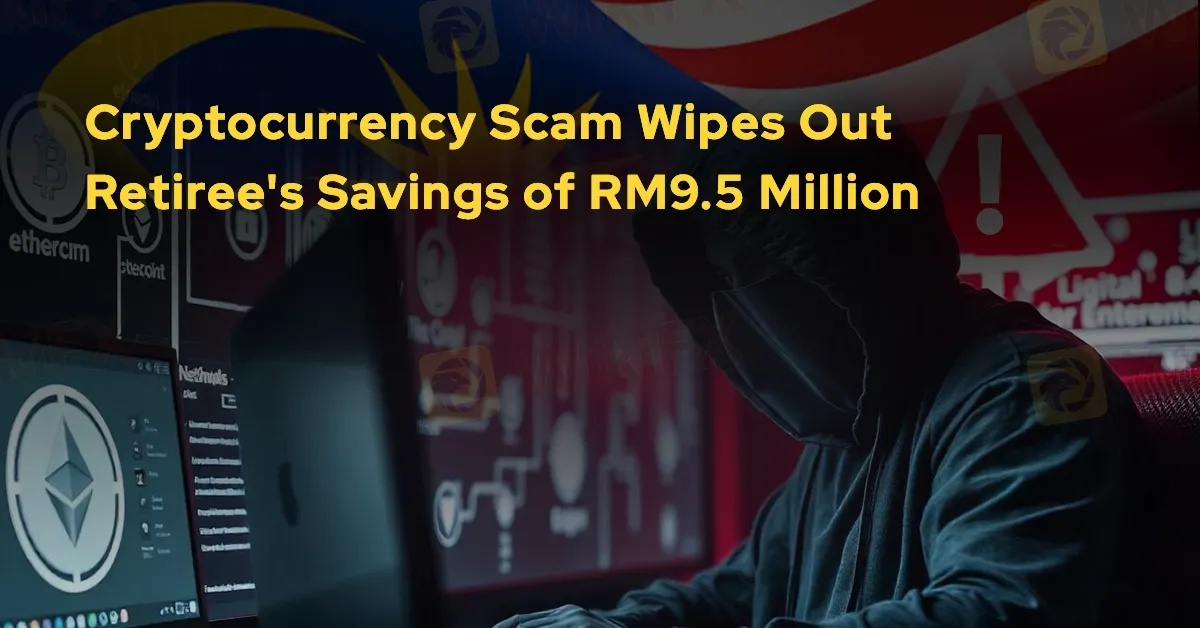简体中文
繁體中文
English
Pусский
日本語
ภาษาไทย
Tiếng Việt
Bahasa Indonesia
Español
हिन्दी
Filippiiniläinen
Français
Deutsch
Português
Türkçe
한국어
العربية
Cryptocurrency Scam Wipes Out Retiree's Savings of RM9.5 Million
Abstract:A 63-year-old retired engineer from Johor has lost RM9.5 million in a cryptocurrency scam. He was misled by an online advertisement that promised high returns on Bitcoin investments in July 2024.

A 63-year-old retired engineer from Johor has lost RM9.5 million in a cryptocurrency scam. He was misled by an online advertisement that promised high returns on Bitcoin investments.
In July 2024, the man saw the advertisement and clicked on the link. He was directed to a WhatsApp group. Two individuals contacted him and explained how he could invest. They claimed he could earn up to 50 times his initial investment.
The man downloaded a recommended application. He registered an account and began monitoring his investments. Between October and December 2024, he made 29 separate transactions. He transferred money to 11 different bank accounts provided by the fraudsters.

At first, he was told his investment had earned a profit of RM88 million. When he tried to withdraw the money, the scammers demanded RM800,000 as a processing fee. This made him realise he had been cheated.
The Johor Police Chief, Datuk M. Kumar, said the case is under investigation. The police are handling it under Section 420 of the Penal Code. This section deals with cheating and can result in imprisonment of up to ten years, fines, or caning.

As incidents like this become increasingly common, tools such as WikiFX can play a vital role in helping individuals verify the legitimacy of brokers and financial platforms. WikiFX offers an extensive database of global broker profiles, regulatory status updates, and user reviews, enabling users to make informed decisions before committing to any financial investment. Its risk ratings and alerts for unlicensed or suspicious entities help investors easily spot red flags and avoid potential scams. By using tools like WikiFX to research a broker's background, individuals can safeguard their hard-earned savings and reduce the risk of falling victim to fraudulent schemes.

Disclaimer:
The views in this article only represent the author's personal views, and do not constitute investment advice on this platform. This platform does not guarantee the accuracy, completeness and timeliness of the information in the article, and will not be liable for any loss caused by the use of or reliance on the information in the article.
Read more

Tether Reacts to MiCA Regulations as Crypto.com Delists USDt in Europe
Tether criticizes MiCA-triggered delistings in Europe, warning of market risks. Crypto.com removes USDt and 9 other tokens to comply with EU crypto regulations.

Kraken Brings Back Crypto Staking for U.S. Users as Regulations Ease
Kraken reintroduces crypto staking for U.S. users in 39 states, supporting 17 assets with slashing insurance as regulations ease.

Trump Media Expands into Crypto with $250M Truth.Fi Investment
Trump Media & Technology Group launches Truth.Fi, investing $250M in crypto and financial services, aiming to revolutionize decentralized finance.

Crypto.com Delists USDT and 9 Tokens to Comply with MiCA Regulations
Crypto.com delists USDT and 9 tokens to comply with MiCA regulations. Users must withdraw assets by March 31. Learn more about MiCA’s impact on stablecoins.
WikiFX Broker
Latest News
AI Fraud Awareness Campaign: "We're Not All F**ked"
Crypto.com Delists USDT and 9 Tokens to Comply with MiCA Regulations
How to Use Financial News for Forex Trading?
Fake ‘cyber fraud online complaint’ website Exposed!
Day Trading Guide: Key Considerations
GMO-Z com Securities Thailand to Cease Operations in 2025
Oil Prices at $90 to $100 Could Push Philippines Inflation Beyond Target
Do More Liquid Currencies Yield Higher Profits?
Trump Media Expands into Crypto with $250M Truth.Fi Investment
NAGA Launches CryptoX: Zero Fees, 24/7 Crypto Trading
Currency Calculator






